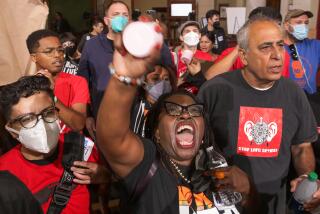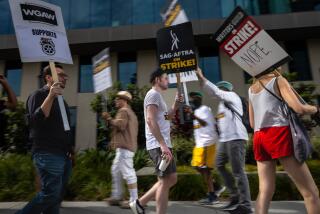L.A. Strike Opens Rift at City Hall
- Share via
As work returns to normal for the city of Los Angeles, recriminations from last week’s two-day walkout by members of the Engineers and Architects Assn. continue to roil the city’s leadership.
City officials are annoyed that on the eve of the strike, the office of City Atty. Rocky Delgadillo did not personally serve union members with copies of a restraining order directing employees in sensitive positions to report to work.
The order was granted Aug. 21 by Superior Court Judge Dzintra Janavs.
It required that 200 workers in key positions at the airport, Police Department and the city’s coastal sewage treatment plant remain on the job.
Most of those employees did, in fact, work during the two-day strike that began last Tuesday. But about 20 workers didn’t report to their jobs, and the city attorney -- at the instruction of the mayor -- began contempt-of-court proceedings against them last week.
City officials worry that their case against the workers will be undermined by the city attorney’s failure to serve papers to those workers. The case is scheduled to go to trial Sept. 20.
“The mayor was committed to protecting public safety during the strike, and that’s why he directed the city attorney to seek the temporary restraining order,” said Matt Szabo, a mayoral press secretary.
Szabo, however, declined to comment on inquiries about a rift between the mayor and the city attorney over how the situation was handled.
Nick Velasquez, a spokesman for Delgadillo, defended his boss’ actions.
“All 200 employees had notice of the restraining order, whether through physical service or other means, which could include the telephone, things like that or reading about it in news reports,” he said. “It still counts as them being served.”
The mayor, according to sources, instructed City Administrative Officer Bill Fujioka to write a report on the method in which employees were served with the restraining orders. Fujioka would not comment Monday.
The association called its strike last week after the City Council approved a new contract for the union that failed to match a more generous deal given to Department of Water and Power workers last year.
The union went back to work Thursday, but officials have threatened another strike if the new contract isn’t renegotiated with a higher pay increase.
The prospect of a second strike is the reason the mayor’s office believes it is important to go ahead with contempt proceedings.
Another source of frustration for the mayor’s office has been the city attorney’s handling of the case.
First, a judge rebuked Delgadillo’s lawyers for not having sufficient paperwork to justify a restraining order. Then, once the restraining order was granted, the judge told Delgadillo’s attorneys that they would have to hurry to serve workers.
In addition, Delgadillo told reporters that he would not cross picket lines -- a statement viewed by the mayor’s office as a deliberate attempt to weaken the mayor’s bargaining position with the union.
The day before the strike, Velasquez explained Delgadillo’s refusal to cross the picket lines: “It’s very typical for elected officials who are Democrats who have beliefs and values -- and one of those is not crossing the picket lines because working people are the backbone of the party.”
Crossing picket lines is an especially sensitive subject for Villaraigosa, a staunch Democrat and former union organizer who had never crossed a picket line until last week. The mayor said that though he respected the right of workers to strike, he believed that the city couldn’t afford to give the union the same contract given to DWP employees.
In an interview Friday, Delgadillo said he didn’t know how many workers were individually served with the restraining order.
Delgadillo also said his refusal to cross the picket lines did not keep him from working during the walkout. Unlike striking city employees -- who were docked two days’ pay -- Delgadillo drew a salary for those two days.
“I was outside the office and had full days scheduled across the city,” he said. Robert Aquino, chief of the union, said the city attorney’s office didn’t begin serving papers to the union members who were required to remain at work until Wednesday.
“What I have been told is that the city started to make phone calls and contacted answering machines and family members” of union members “and started telling them that the individuals were restrained from picketing” the night before the strike, Aquino said.
“But they didn’t serve them papers. They did start serving people on Wednesday, and those people who were served immediately went back to work,” he said.
There are likely exceptions for emergencies, but California courts generally prefer that restraining orders are physically served to people whom they are trying to restrain, said Max Factor III, a Beverly Hills mediator and the incoming chairman of the State Bar of California panel on administration of justice.
Factor was not speaking on behalf of the state bar.
“Using common sense, judges simply don’t wish to restrain other people’s behavior and prevent them acting unless a person has received physical notice of that order,” Factor said.
He added that it would be difficult to hold someone in contempt of court if a person never knew they were being restrained.
The city workers who were required to remain on the job included those who do maintenance and inspections on runways at three airports -- including Los Angeles International -- and employees who handle police and fire communications.
More to Read
Sign up for Essential California
The most important California stories and recommendations in your inbox every morning.
You may occasionally receive promotional content from the Los Angeles Times.










